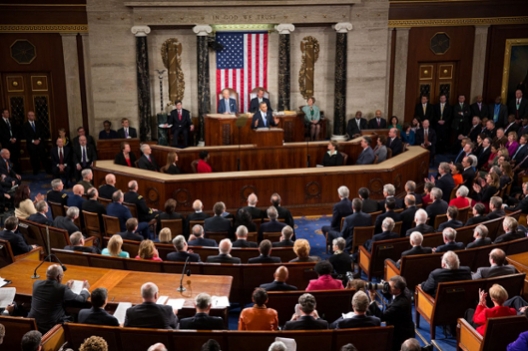 As Barack Obama began the sixth year of his presidency with a State of the Union address tilted heavily toward domestic issues, how well did he reflect a clear strategic vision on the global challenges to US interests?
As Barack Obama began the sixth year of his presidency with a State of the Union address tilted heavily toward domestic issues, how well did he reflect a clear strategic vision on the global challenges to US interests?
Not too well, says Atlantic Council Vice President Barry Pavel.
Not too badly, say Council member Jane Holl Lute and Senior Fellow Barbara Slavin.
The speech reflected “a strong strategic message of US leadership through diplomacy” and a departure from America’s constant wartime footing in the years since the September 11, 2001 attacks, Lute said in a January 29 conference call with Atlantic Council members. Lute, who served until last April as a deputy secretary of homeland security, is now president of the Arlington, Virginia-based Council on CyberSecurity.
Pavel, who also served as an Obama aide, on the National Security Council, disagreed: “To say that we will not undertake large-scale, ground combat operations does not equal a strategy,” Pavel said. An administration that has sought strategically to focus more on US relations with east Asia is instead spending its time reacting to constant crises in the Middle East, he said.
Barbara Slavin, a specialist and author on Iran, said the current US focus on negotiations to set controls on Iran’s nuclear technology could lead to a “tremendous change in our relationship with Iran over time and that that would have a transformative affect upon the region.”
You can listen to audio of the conference call, or watch Obama’s speech. And below are highlights from the conference call and other responses by Atlantic Council analysts to the speech.
State of the Union 2014: Any Foreign Policy Strategy There? by Atlantic Council
ON EXPANDING TRADE
“President Obama offered a carefully-worded endorsement of his trade agenda last night, including the bipartisan trade promotion authority bill introduced by Senator Baucus and Congressman Camp earlier this month—calling for progress on the two historic trade deals being pursued by his administration with Europe and Asia,” wrote Garrett Workman, associate director of the Council’s program on global business and economics. “The President used his State of the Union remarks on trade to emphasize the opportunity to expand ‘Made in the USA’ export opportunities and create jobs at home, especially for small and medium-sized enterprises. Tellingly, it was also the first reference to foreign policy in his speech, and his comments on trade received applause and encouragement from members of both political parties in the audience.”
ON SYRIA
Obama’s brief reference to Syria offered “not much to be mined in terms of policy nuggets” on the civil war there, wrote Senior Fellow Fred Hof in a post on the Council’s MENASource blog. Hof, a former Obama advisor on Syrian issues, The speech signals no change in a “minimalist approach” by the Obama administration to helping non-extremist opponents of Syrian President Bashir Assad – an approach that “has inadvertently worked to the advantage of both the Assad regime and armed elements representing a range of sectarian and jihadist sentiment,” Hof wrote.
ON EGYPT
Egypt is a “terrible conundrum” for the United States that went conspicuously unaddressed in the president’s speech, Slavin said, an omission the more notable in the midst of Egypt’s complete reversion to military dictatorship.
ON A US TILT TOWARD DIPLOMACY
“The way he talked about what US foreign policy priorities are toward Iran and Afghanistan and the war on terror I think sent very clear strategic messages,” Lute said in the conference call. “We are moving away from a constant wartime footing … and we are focusing on the real structural issues, for example, Iran’s nuclear capability an issue of strategic importance in the most volatile region of the world … He emphasized, and it was quite striking, that diplomacy is now the way in which the United States will lead.”
ON BALANCING THE POLICY CHALLENGES
“I give him high marks for a lot of emphasis … [on the issues of trade, innovation, investment and immigration], which blur the lines between foreign and domestic policy,” said Pavel. “But on the classic foreign policy and defense policy issues, I sort of am not as favorable. For an administration that’s about to release a defense strategy review report within about 30 days that reinforces the rebalance or pivot to Asia, I think all of the specifics that the president discussed were in the Middle East. … What’s happening in the real world, what’s happening to the Obama administration’s foreign policy, is the rebalance to Asia is really empty and we’re spending all of our time reacting to all of the developments in the Middle East that are very integral to our national interests. And so I see real-world security challenges impeding the administration’s strategic desire. So overall, I think it was a little bit reactive in this area. I don’t think it was forward looking, I don’t think we’re getting ahead of the trends that we’re spending our time on here [at the Atlantic Council] the trends on urbanization that are critical, the trends on individual empowerment, some of the disruptive technologies.”
ON CYBERSECURITY
Lute noted in the conference call the “light touch” with which the President addressed drones and surveillance reform by “connecting our assessments on privacy to our constitutional ideals rather than discussing privacy as a narrow aspect or by-product of the global war on terror.” Lute suggested that the American public is looking to the federal government for a narrative for understanding cybersecurity which includes an assignment of our roles as individuals and enterprises as well as priorities for action.
